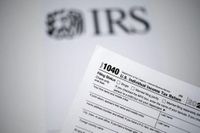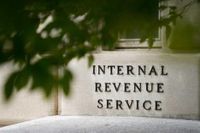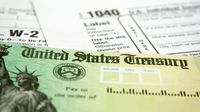HOUSTON, Texas – The deadline for taxpayers to claim the 2021 Recovery Rebate Credit is just days away, with the Internal Revenue Service (IRS) poised to issue special payments in April to 1 million taxpayers who did not claim this credit. If you missed out on your stimulus check during the pandemic, now is the time to act.
While most taxpayers received their COVID-era stimulus checks, some residents may still be eligible for a $1,400 payout. The IRS is taking steps to ensure that individuals who qualify for the Recovery Rebate Credit receive the funds they are entitled to.
The Recovery Rebate Credit was designed to provide financial support to taxpayers during the COVID-19 pandemic. It was available to individuals who did not receive the full amount of the Economic Impact Payments issued in 2020 and 2021. For many, this credit could mean a significant boost in financial relief.
As the federal tax deadline approaches on April 15, 2025, the urgency for eligible taxpayers to file their returns cannot be overstated. Taxpayers who miss this deadline may forfeit their opportunity to claim the Recovery Rebate Credit and other tax benefits. The IRS encourages non-filers to take action before the upcoming deadline.
“Looking at our internal data, we realized that one million taxpayers overlooked claiming this complex credit when they were actually eligible,” IRS Commissioner Danny Werfel noted in a December 2024 news release. To minimize headaches and ensure these funds reach those in need, the IRS is making these payments automatic for eligible individuals.
Filers who never received the funds can claim the Recovery Rebate Credit on their 2021 federal return. The last chance for that credit is the 2024 tax deadline on April 15, according to the IRS. Tax experts recommend checking your IRS account online to confirm whether you received your payment. “That’s the best place to look,” said Tommy Lucas, a certified financial planner.
For those who did not file a return in 2021, it’s critical to do so in order to claim the Recovery Rebate Credit. According to the IRS, individuals who were claimed as dependents, were not U.S. residents, or did not have a valid Social Security Number are not eligible for the credit. The maximum amount for each taxpayer is $1,400, but the IRS uses several factors to determine the exact amount each resident receives.
“If there’s any doubt about your payment, it’s better to file your 2021 return and claim the Recovery Rebate Credit before April 15,” advised Robert Nassau, a law professor at Syracuse University. He emphasized that missing this deadline could result in losing the chance to collect the money.
The IRS also reported that the payments for those who did not claim the Recovery Rebate Credit were sent out starting in December 2024, with most payments arriving via direct deposit or mailed checks by late January 2025. However, another 1 million taxpayers are still missing out on an estimated $1 billion in stimulus simply because they have not filed their 2021 income taxes.
To qualify for the full Recovery Rebate Credit, single filers must have an adjusted gross income of up to $75,000, while married couples filing jointly qualify with a combined income of up to $150,000. The phaseout begins with earnings above those thresholds, and eligibility falls to zero once adjusted gross income reaches $80,000 for single filers or $160,000 for married couples filing together.
April 15, 2025, is not only Tax Day for 2024 returns but also marks the three-year deadline to claim any tax refunds or credits from the 2021 tax year, including the $1,400 Recovery Rebate Credit. Taxpayers who did not receive a stimulus check issued before 2021 are out of luck, as the deadline to file for 2020 has already passed.
Taxpayers in the U.S. that did not file or claim the Recovery Rebate Credit on their 2021 tax return are qualified to apply for it. The IRS has made it clear that if you want to claim your stimulus check, you must file a 2021 federal tax return and claim the Recovery Rebate Credit. If you never filed, you will need to submit a 2021 Form 1040 tax return before the deadline.
“Eligible taxpayers who did not file must file a tax return to claim a Recovery Rebate Credit, even if their income was minimal or non-existent,” the IRS stated. This means that even if you did not earn enough to require filing, you still need to submit a return to receive the credit.
In summary, the IRS is urging all eligible taxpayers to act swiftly. With the deadline looming, it's crucial to file your 2021 tax return to claim the Recovery Rebate Credit and ensure you receive any funds owed to you. The IRS provides resources on its website to help determine how much stimulus you’ve received and to find any missing credits.
As the clock ticks down to April 15, 2025, taxpayers who may have overlooked this opportunity should take a moment to review their financial situations and ensure they don’t miss out on the critical support that the Recovery Rebate Credit can provide.







